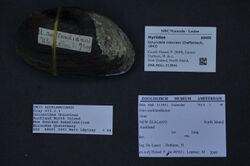Biology:New Zealand freshwater mussel
| New Zealand freshwater mussels | |
|---|---|

| |
| Scientific classification | |
| Kingdom: | |
| Phylum: | |
| Class: | |
| Subclass: | Paleoheterodonta
|
| Order: | |
| Family: | |
| Genus: | Echyridella
|
| Species: | E. menziesii
|
| Binomial name | |
| Echyridella menziesii (Gray, 1843)[1]
| |
| Synonyms[2] | |
| |
The New Zealand freshwater mussel (Echyridella menziesii), also known by its Māori names kākahi, kāeo, and torewai, is a species of freshwater mussel endemic to New Zealand. E. menziesii is an aquatic bivalve mollusc in the family Unionidae, the river mussels.
They were an important food source for the Māori,[3] but like many freshwater mussels worldwide, are now endangered by pollution and eutrophication of rivers, and the introduction of new species of fish[4] leading to actions via the Treaty of Waitangi claims process.[5]
Distribution
Formerly common in lakes, rivers and streams around New Zealand.[6]
Life cycle
Its reproductive cycle is typical of other freshwater mussels, requiring a host fish on which its larvae (glochidia) parasitize and metamorphose into juvenile mussels - most commonly the kōaro (Galaxias brevipinnis)[7][8]
Threats
The destruction or modification of the habitat of the New Zealand freshwater mussel is likely to be a factor in the decline of its population. This modification or destruction of freshwater habitat is also likely to be a factor in the decline in numbers of the mussel's host fish, the kōaro.[9]
Conservation status and efforts
In May 2014 the Department of Conservation classified the New Zealand freshwater mussel under the New Zealand Threat Classification System as "At risk" and "declining".[10]
References
- ↑ "Echyridella menziesii (Gray, 1843)". New Zealand Organisms Register. http://www.nzor.org.nz/names/6da15eb1-ec82-4c9b-98db-6903cd601ed7. Retrieved 24 June 2016.
- ↑ "Echyridella menziesii (Gray, 1843)". World Register of Marine Species. http://www.marinespecies.org/aphia.php?p=taxdetails&id=819815. Retrieved 24 June 2016.
- ↑ "Resource Management Issues of Significance to Iwi"
- ↑ "The kakahi (Hyridella menziesi) in a general framework of lake health", 2008, Joseph Butterworth (MS thesis)
- ↑ "Muriwhenua Fisheries Claim / SOE Claim", Waitangi Tribunal
- ↑ "Freshwater mussel", Te Ara website
- ↑ "Decline of the kakahi - identifying cause and effect", NIWA, Water & Atmosphere › Vol.10 No.4 - December 2002
- ↑ "Kākāhi - the mysterious freshwater mussel", Greater Wellington Regional Council website
- ↑ "Kākahi". National Institute of Water and Atmosphere. https://www.niwa.co.nz/our-science/freshwater/tools/kaitiaki_tools/species/kakahi. Retrieved 24 June 2016.
- ↑ Grainger, Natasha; Collier, Kevin; Hitchmough, Rod; Harding, Jon; Smith, Brian; Sutherland, Darin (May 2014). Conservation status of New Zealand freshwater invertebrates, 2013. Wellington, New Zealand: Department of Conservation. p. 15. ISBN 9780478150155. http://www.doc.govt.nz/Documents/science-and-technical/nztcs8entire.pdf. Retrieved 24 June 2016.
Further reading
- Powell A. W. B., New Zealand Mollusca, William Collins Publishers Ltd, Auckland, New Zealand 1979 ISBN:0-00-216906-1
- Manual of the New Zealand mollusca, 1913, Henry Suter
- Spencer, H.G., R.C. Willan, B. Marshall & T.J. Murray. 2011. Checklist of the Recent Mollusca recorded from the New Zealand Exclusive Economic Zone.
External links
- Lectotype specimen collected by William Colenso and held at Museum of New Zealand Te Papa Tongarewa.
Wikidata ☰ Q3017763 entry

